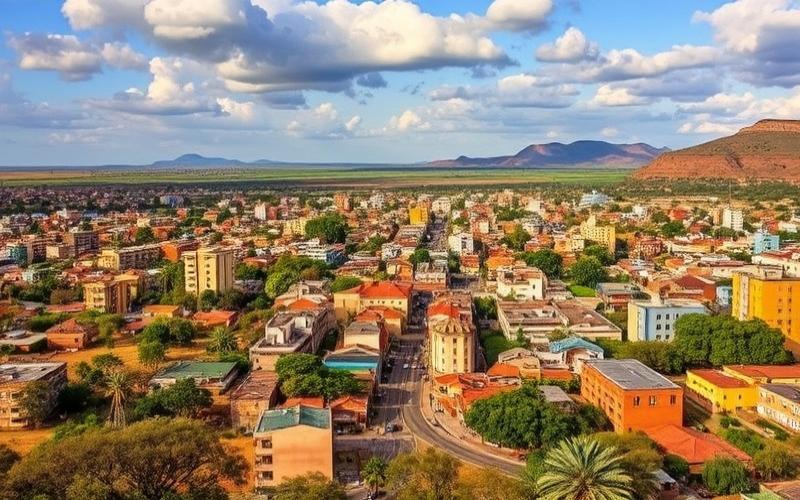
 Published on and written by Cyril Jarnias
Published on and written by Cyril Jarnias
Anti-Discrimination Laws in South Africa: Protecting Expatriates
South Africa, a country with a tumultuous history marked by apartheid, now stands out for its robust anti-discrimination laws aimed at protecting the fundamental rights of all its inhabitants, including expatriates.
In a context where cultural diversity and international interactions are constantly growing, understanding these laws becomes essential for anyone considering settling in this dynamic country.
From protection against racial and gender discrimination to equal employment opportunities, these legislations provide essential legal recourse for expatriates facing discriminatory situations.
Illuminating these legal mechanisms can not only boost newcomers’ confidence but also encourage deeper respect for equality and justice values on South African soil.
Anti-Discrimination Laws in South Africa: An Overview
South Africa has undergone a remarkable evolution in its anti-discrimination laws, transitioning from a system legalizing racial segregation to a legal framework focused on equality and protection of fundamental rights.
Brief History of Anti-Discrimination Laws:
- 1948–1991: Apartheid was established, supported by a series of laws such as the Group Areas Act (1950) and the Population Registration Act (1950), which divided the population into distinct racial groups and prohibited interracial marriages. Discrimination became institutionalized.
- 1960–1976: Sharpeville Massacre, followed by Soweto Uprising. Under growing international pressure, some reforms were attempted but remained insufficient.
- 1991–1996: Official end of apartheid through movements led by Nelson Mandela and the progressive adoption of a new constitution guaranteeing equal rights for all.
- Since 2000: Strengthening of the legislative framework against all forms of discrimination, notably with the enactment of PEPUDA.
| Period | Key Law/Event | Main Impact |
|---|---|---|
| Apartheid (1948–1991) | Group Areas Act, Population Registration Act | Institutionalized racial segregation |
| Transition (1990s) | Abolition of apartheid laws | Beginning of equality process |
| Post-apartheid Democracy | South African Constitution (1996), PEPUDA (2000) | Legal protection against discrimination |
Main Laws Currently in Effect:
- South African Constitution (1996)
Objective: Establish equality before the law for all citizens, explicitly prohibit any form of discrimination based on race, gender, or social origin.
Mechanism: Any person can approach the courts for violation of fundamental rights. - Promotion of Equality and Prevention of Unfair Discrimination Act (PEPUDA) – 2000
Objective: Address constitutional gaps in combating hateful acts or discriminatory speech.
Mechanism: Creation of specialized courts (“Equality Courts”), simplified procedures allowing any victim — including expatriates — to seek redress or sanctions. - South African Labor Code
Objective: Ensure fair treatment at work without distinction related to ethnic origin or migrant status.
Mechanism: Administrative recourse via Commission for Conciliation Mediation and Arbitration; possibility of legal action if necessary.
Summary list:
- Constitution = universal foundation
- PEPUDA = extended protection against all forms of inequality
- Labor Code = specific application in professional world
Specific Protections Offered to Expatriates Living in South Africa
Expatriates fully benefit from protections offered by these texts:
- They can directly approach specialized courts in cases of discrimination based on national or cultural origin.
- Employers cannot cite foreign status as valid grounds for denying employment or applying lower compensation.
- In case of discriminatory acts in public or private contexts, possible recourse through:
- Equality Courts
- South African Human Rights Commission
Practical examples / case studies:
- A European engineer who suffered exclusion during an internal procedure can file a complaint with a specialized court that will objectively examine whether there was unfair treatment based on nationality.
- Several high-profile cases have seen companies condemned for denying promotions to certain foreign employees under “cultural” pretexts, demonstrating that these recourses are effective and practically applied.
Synthetic list – available recourses:
- Direct petition to Equality Courts
- Mediation through specialized commissions
- Possible free legal assistance through public organizations
South African anti-discrimination laws guarantee expatriates total equality before the law — any discriminatory act can be effectively challenged through a robust and accessible judicial arsenal.
These mechanisms not only contribute to the continuous strengthening of the social fabric but also offer foreigners working or residing locally genuine legal security against persistent legacies from apartheid.
Good to Know:
Anti-discrimination laws in South Africa evolved post-apartheid with key texts like PEPUDA, guaranteeing equal rights and offering expatriates recourse against discrimination; a concrete example is the case of an expatriate employee who obtained redress through the Constitution for wrongful termination linked to nationality.
Recourse for Expatriates: Understanding Your Rights
The Employment Equity Act and the South African Constitution explicitly protect expatriates against discrimination based on race, gender, age, religion, disability, or other grounds identical to those applicable to local citizens.
| Protection | Expatriate | Local Worker | Specificity |
|---|---|---|---|
| Non-discrimination | ✔️ | ✔️ | Identical grounds |
| Fair salary | ✔️ | ✔️ | According to contract/law |
| Legal recourse | ✔️ | ✔️ | Identical procedure |
| Security/conditions | ✔️ | ✔️ | Universal standards |
| Leave/sickness/health | ✔️ | ✔️ | Equal rights except private scheme |
Main Laws Protecting Expatriates:
- Employment Equity Act: specifically covers any employment-related discrimination.
- Equality Act: prohibits any unfair discrimination in all other areas of civil and social life.
- Constitution (1996): explicitly prohibits all forms of discrimination and guarantees equality before the law.
Competent Bodies & Authorities for Filing Complaints or Seeking Help:
- Commission for Conciliation, Mediation and Arbitration (CCMA): disputes related to work and employment.
- Equality Courts (“equality courts” attached to each provincial division of High Court) for any discriminatory grounds outside employment.
- South African Human Rights Commission (SAHRC): complaints regarding fundamental human rights.
Concrete examples of expatriates who exercised these rights:
- A French engineer under contract filed a complaint with CCMA after being fired due to alleged nationality; obtained redress through reinstatement or compensation thanks to Employment Equity Act.
- Foreign teachers victims of racial harassment appealed to Equality Courts to obtain sanctions against their private employers.
Process for Filing Recourse:
- Gather all written evidence (contract, emails, testimonies).
- Approach either CCMA (employment) or competent court/Equality Court depending on concerned area.
- Officially file complaint by completing specific form available online or physically at concerned institutions.
- Respect maximum timeframe generally set between 30 days (recourse to CCMA after termination) and 6 months depending on civil jurisdictions;
- Follow preliminary mediation/conciliation procedure if required before formal hearing;
- Be accompanied if needed by specialized lawyer or seek free advice from SAHRC;
Available legal resources:
- Specialized international labor law attorneys
- Free assistance via SAHRC
- Local union advice
- Consular services
Synthetic List – Useful Organizations:
- Commission for Conciliation, Mediation and Arbitration (CCMA)
- Equality Courts / Local High Court
- South African Human Rights Commission
- Professional unions
Key Takeaway: Legally employed expatriates benefit from the same protections as South Africans; no official grounds limit their access to legal recourse as long as they respect their administrative status (valid visa, formal contract). However, some cases may require official translation or specialized legal assistance.
Potential Differences Between Expatriate Rights and South African Nationals:
- Protections are equivalent as long as administrative status is regular;
- Only certain reserved social benefits may differ depending on private scheme chosen by employer;
- Effective access may be hindered by language/legal barriers but not legally restricted;
Important: Any victimized expatriate must act quickly to ensure their case remains admissible within imposed deadlines — it’s strongly advised to immediately consult a specialized structure upon suspicion of abuse or discrimination to avoid any dismissal due to administrative prescription.
Good to Know:
In South Africa, anti-discrimination law prohibits any form of unequal treatment based on race, gender, or nationality, thus protecting expatriates who can file complaints with the Commission for Gender Equality or South African Human Rights Commission in case of discrimination; it’s essential to respect strict filing deadlines and obtain legal counsel to prepare necessary documents.
The Protection Commission: A Key Player Against Discrimination
The South African Human Rights Commission plays a crucial role in combating discrimination, particularly targeting expatriates and foreign persons in South Africa. It’s mandated by the South African Constitution and a 1994 law to monitor, prevent, and sanction human rights violations, including those based on nationality, race, or migrant status.
Examples of Effective Interventions:
- The Commission has handled numerous cases where expatriates or non-nationals were victims of xenophobia, police brutality, or hate speech, particularly during socio-economic crises or election tensions.
- It intervened to denounce slow processing and discriminatory practices in asylum seeker cases, exposing them to risks of deportation or arbitrary detention.
- The Commission also mobilized against negative stereotypes targeting foreigners, especially in media and political discourse.
Complaint Filing Mechanism:
- Any person, including expatriates, can approach the Commission in case of perceived discrimination.
- Complaints can be filed in person, by mail, or online.
- The Commission investigates independently, can organize mediations, recommend reparations, or refer cases to competent judicial authorities.
Collaboration with Other Organizations:
- The Commission works in partnership with national bodies, such as specialized equality courts and other rights defense institutions.
- It maintains relations with international organizations, including the UN Committee on the Elimination of Racial Discrimination (CERD), to harmonize South African legislation with international standards.
- It participates in joint awareness campaigns and improvement of public anti-discrimination policies.
| Challenges Faced | Progress Achieved |
|---|---|
| Persistence of structural inequalities inherited from apartheid | Explicit inclusion in anti-discrimination law of vulnerable categories (nationality, migrant status, sexual orientation) |
| Persistent xenophobia minimized by some authorities | Faster responses to complaints, pressure on government to reform police practices |
| Hate speech and stereotypes against foreigners | Increased collaboration with civil society and international bodies |
| Slow processing of asylum applications | Development of educational tools to promote equality and diversity |
Key Points to Remember:
- The Commission acts as a bulwark against all forms of discrimination, including those affecting expatriates.
- Its mandate is broad: prevention, investigation, reparation, education, and advocacy.
- Despite persistent challenges, progress achieved strengthens legal and social protection for expatriates and other vulnerable groups.
Protection against discrimination, particularly for expatriates, rests on strong institutional commitment from the South African Human Rights Commission, supported by national and international collaboration and mechanisms accessible to all for asserting rights.
Good to Know:
South Africa’s Protection Commission plays a crucial role in handling discrimination cases affecting expatriates, such as those based on migrant status, and collaborates with international organizations to strengthen anti-discrimination laws; complaints can be filed online or during dedicated sessions in multiple languages. Despite limited resource challenges, the Commission has progressed in raising awareness about expatriate rights and establishing better inter-institutional collaboration practices.
Disclaimer: The information provided on this website is for informational purposes only and does not constitute financial, legal, or professional advice. We encourage you to consult qualified experts before making any investment, real estate, or expatriation decisions. Although we strive to maintain up-to-date and accurate information, we do not guarantee the completeness, accuracy, or timeliness of the proposed content. As investment and expatriation involve risks, we disclaim any liability for potential losses or damages arising from the use of this site. Your use of this site confirms your acceptance of these terms and your understanding of the associated risks.
























































